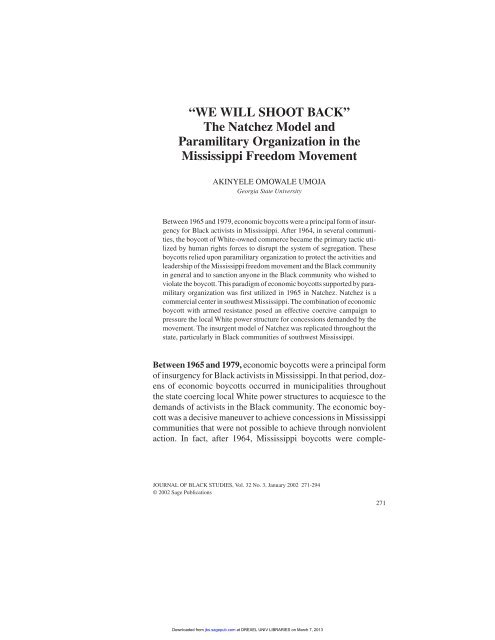MXGM Self-Defence Manual
MXGM Self-Defence Manual
MXGM Self-Defence Manual
You also want an ePaper? Increase the reach of your titles
YUMPU automatically turns print PDFs into web optimized ePapers that Google loves.
Umoja JOURNAL / MISSISSIPPI OF BLACK FREEDOM STUDIES MOVEMENT<br />
/ JANUARY 2002<br />
“WE WILL SHOOT BACK”<br />
The Natchez Model and<br />
Paramilitary Organization in the<br />
Mississippi Freedom Movement<br />
AKINYELE OMOWALE UMOJA<br />
Georgia State University<br />
Between 1965 and 1979, economic boycotts were a principal form of insurgency<br />
for Black activists in Mississippi. After 1964, in several communities,<br />
the boycott of White-owned commerce became the primary tactic utilized<br />
by human rights forces to disrupt the system of segregation. These<br />
boycotts relied upon paramilitary organization to protect the activities and<br />
leadership of the Mississippi freedom movement and the Black community<br />
in general and to sanction anyone in the Black community who wished to<br />
violate the boycott. This paradigm of economic boycotts supported by paramilitary<br />
organization was first utilized in 1965 in Natchez. Natchez is a<br />
commercial center in southwest Mississippi. The combination of economic<br />
boycott with armed resistance posed an effective coercive campaign to<br />
pressure the local White power structure for concessions demanded by the<br />
movement. The insurgent model of Natchez was replicated throughout the<br />
state, particularly in Black communities of southwest Mississippi.<br />
Between 1965 and 1979, economic boycotts were a principal form<br />
of insurgency for Black activists in Mississippi. In that period, dozens<br />
of economic boycotts occurred in municipalities throughout<br />
the state coercing local White power structures to acquiesce to the<br />
demands of activists in the Black community. The economic boycott<br />
was a decisive maneuver to achieve concessions in Mississippi<br />
communities that were not possible to achieve through nonviolent<br />
action. In fact, after 1964, Mississippi boycotts were comple-<br />
JOURNAL OF BLACK STUDIES, Vol. 32 No. 3, January 2002 271-294<br />
© 2002 Sage Publications<br />
271<br />
Downloaded from jbs.sagepub.com at DREXEL UNIV LIBRARIES on March 7, 2013


